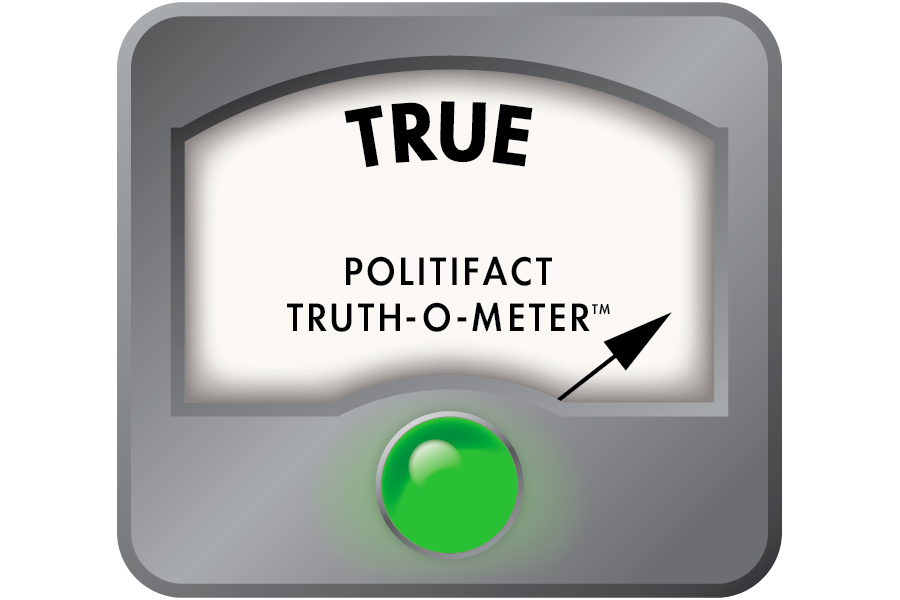UPDATED at 6:30 a.m. PT on Feb. 20: This story was updated to include comments from the Bloomberg campaign we received after the story was posted. The comments do not change the rating.
Sparring over health care during the Nevada Democratic presidential primary debate, former Vice President Joe Biden took issue with former New York City Mayor Mike Bloomberg’s record on the Affordable Care Act.
“From the moment we passed that signature legislation, Mike called it a disgrace,” Biden said, a claim he repeated another time during the debate.
Bloomberg sought to refute that charge, arguing that he defended the law and believed it should be expanded.
It was a heated moment. Both candidates are trying to tie themselves to former President Barack Obama, who spearheaded the 2010 legislation. So we decided to dig in.
We reached out to both campaigns for comment. The Biden campaign sent a CNN article, which cited a speech Bloomberg gave at the Dartmouth Presidential Lecture in July 2010 — just a few months after the health care legislation was passed in March. In the speech, Bloomberg called the Affordable Care Act “a disgrace.” Bloomberg’s campaign directed us to statements he put out in the lead-up to the law’s passage, calling for the inclusion of a public health insurance option people could buy into.
The Remarks
We found a video of the speech on YouTube. In the video, Bloomberg was unsparing.
“We passed a health care bill that does absolutely nothing to fix the big health care problems in this country. It is just a disgrace,” he said. “The president, in all fairness, started out by pointing out what the big problems were, but then turned it over to Congress, which didn’t pay any attention to any of those big problems and just created another program that’s going to cost a lot of money.”
Those aren’t standalone remarks. As recently as 2014, Bloomberg called the law “really dysfunctional” during a talk he gave at the annual meeting of SIFMA, one of the financial industry’s trade groups.
Both times, Bloomberg was still a registered Independent — he didn’t become a Democrat until 2018.
It’s also worth noting that Bloomberg wasn’t espousing a minority view. The ACA’s approval rating was underwater until 2017, according to polling by the Kaiser Family Foundation. (KHN is an editorially independent program of the Foundation.)
Bloomberg’s Response
On the debate stage, Bloomberg sought distance from those remarks, saying he is a “fan of Obamacare.”
“I wrote something supporting it either in the New York Post or the Daily News,” he said.
Bloomberg’s campaign pointed us to a 2009 New York Daily News op-ed that called for a public option, along with other statements. But those weren’t his only writings on the law.
A March 27, 2017, New York Post piece, for instance, also talks about the ACA. But it came years after Bloomberg’s mayorship ended. And while words like “disgrace” don’t appear, calling the piece a “defense” of the law isn’t entirely fair.
In it, Bloomberg noted some key shortcomings — for instance, the health law left 30 million people uninsured. He also argued in support of some ideas more popular with Republicans, such as high-risk insurance pools, as a way to bring down costs.
“It’s regrettable that none of these ideas was seriously considered in the rush to repeal ObamaCare,” Bloomberg wrote at the time.
It is worth noting that Bloomberg’s current health care plan would build on the ACA, largely by increasing subsidies for people buying private insurance on the exchanges, and by installing a Medicare-like public option. (That plan is quite similar to what’s been touted by Biden himself, as well as by candidates like former South Bend, Indiana, Mayor Pete Buttigieg.)
Our Ruling
Biden said that Bloomberg called the ACA “a disgrace.”
Evidence supports that. And it’s not the only time Bloomberg took issue with the law — even if it is a core component of his current proposal for health reform.
We rate this claim True.
This story was produced by Kaiser Health News, an editorially independent program of the Kaiser Family Foundation.
